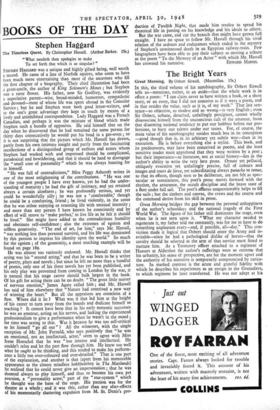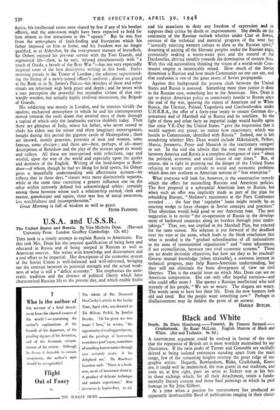The Bright Years
Great Morning. By Osbert Sitwell. (Macmillan. 15s.)
IN this, the third volume of his autobiography, Sir Osbert Sitwell tells us—mentions, rather, in an aside—that the whole work is in effect a poem: "I can claim never to have written a book, or a short story, or an essay, that I did not conceive as if it were a poem, and in that resides the value, such as it is, of my work." That last sen- tence—so objective, so modest and so wrong—is very English ; even Sir Osbert, urbane, detached, unfailingly percipient, cannot wholly disassociate himself from the unconscious cult of the amateur, from that disarming national tendency to put our hobbies before our pro- fessions to bury our talents under our tastes. For, of course, the main value of his autobiography resides much less in its conception —good though that is, in its arbitrary yet subtle way—than in its execution. He is before everything else a stylist. This book, and its predecessors, may have been conceived as poems, and the least sensitive reader must apprehend that they were written by a poet ; but their importance—as literature' not as social history—lies in the author's ability to write the very best prose. Ornate yet pellucid, obliquely evocative yet unfailingly precise, full of colours and images and tours de force, yet subordinating always panache to tenue, so that its effects, though seen to be deliberate, are not felt as spec- tacular or ostentatious, this poet's prose moves forward with the rhythm, the assurance, the occult discipline and the brave state of a fleet under full sail. The poet's afflatus unquestionably helps to fill the sails ; but the timbers and canvas, the crews and the course and the command derive from his skill in prose.
Great Morning bridges the gap between the personal unhappiness of the author's schooldays and the national tragedy of the First World War. The figure of his father still dominates the stage, even when he is not seen upon it. "What my character needed to regenerate it, my father told me constantly, was for me to have to do something unpleasant every—and, if possible, all—day." This con- viction made it logical that Osbert should enter the Army and in- evitable—since he had a pathological dislike of horses—that the cavalry should be selected as the arm of that service most fitted to nurture him. As a Yeomanry officer attached to a regiment of Hussars at Aldershot the author's sufferings were so extreme that his urbanity, his sense of perspective, are for the moment upset and the authority of his narrative is temporarily compromised by carica- ture. In marked contrast is the acute and grateful fidelity with which he describes his experiences as an ensign in the Grenadiers, to which regiment he later transferred. He was not adept at his duties, his intellectual tastes were shared by few if any of his brother officers, and the ante-room might have been expected to hold for him almost as few attractions as the "square." But he was free from the atmosphere of fault-finding and frustration which his father imposed on him at home, and his freedom was no longer qualified, as at Aldershot, by the ever-present menace of horseflesh. Sir Osbert enjoyed his pre-war service with the Foot Guards, and regimental life—then, as he says, infused simultaneously with "a touch of Ouida, a breath of the Boer War "—has not very expectedly inspired some of the best descriptive writing in this book. Early-, morning parade in the Tower of London ; the adjutant superintend- ing the fitting of a newly-joined officer's uniform ; dinner on guard at the Bank or in St. James's Palace—his sketches of these and other rituals are informed with both grace and depth ; and he treats with a rare perception the powerful but recondite virtues of that out- wardly wooden, but actually highly civilised microcosm, the Brigade of Guards.
His soldiering was mostly in London, and he conveys vividly the opulent, enchanted atmosphere in which he and his contemporaries moved towards the swift doom that awaited most of them through a capital of which only the landmarks survive shabbily today. Then there are glimpses of Italy, where his father, who never ceased to chide his eldest son for minor and often imaginary extravagances, bought during this period the gigantic castle of Montegufoni ; there are shrewd, mostly generous, portraits of men and women, some famous, some obscure ; and there are—best, perhaps, of all—more descriptions of Renishaw and the play of the seasons upon its woods and valleys. All these are interspersed with reflections, sage and wistful, upon the way of the world and especially upon the quirks and destinies of the English. Writing of the head-keeper at Reni- shaw—of whom, though he had n,-) liking for field sports, Sir Osbert gives a beautifully understanding and affectionate account—he reflects that in those days "classes were more distinctively separate, while at the same time exercising a greater influence one on the other within narrowly defined but acknowledged orbits: certainly among those between whom such a relationship existed, clerk and master, gamekeeper and squire there was less of social awareness, less watchfulness and incomprehension."
Great Morning is full of wisdom as well as grace. PETER FLEMING.































 Previous page
Previous page